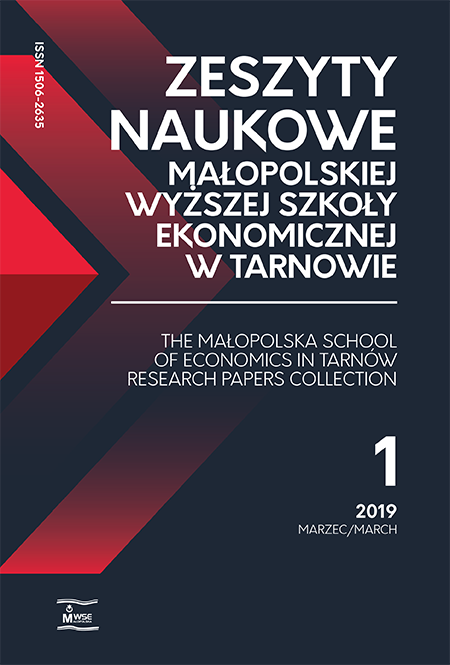Abstract
The aim of the article is to present the concept of the analysis determinants of the work time system in the enterprise and the display of tools this analysis as well as the presentation of empirical research results. Work time analysis still remains a poorly recognized issue of economic analysis. The basic research problem is the identification of the organizational gap, which can be described as the difference between the working method used in the company and the employed working time system, as well as indication of the possible ways of the gap elimination. A thesis, assuming the correspondence between the working time system and the working method, was adopted. The concept of working method mentioned in the article includes: elements of the production system, elements of the work system, working conditions as a rule and work–life balance. These systems (subsystems of the working method) should take into account the principle of economy of operation. The course of analytical procedure (research methodology, suggested in the article, includes the following stages: identification of organizational units and substructures of the enterprise as well as the applied method of work, analysis and evaluation of the working time system, determination of ways, to improve the working time system. In support of the thesis, the empirical part of the article presents the results of research in the form of a case study (case study analysis). It describes and assesses work time systems together with identified methods of work in the electrical industry enterprise and food industry. The economic analysis results were supplemented with opinions of the management staff and employees, being used to improve the existing working time system. The research methods were used to implement the indicated purpose: the analysis of the prior research results, economic analysis, the elements of ergonomic analysis, interview and questionnaire.
References
Borkowska, S. (2004). Praca a życie pozazawodowe. W: S. Borkowska (red.). Przyszłość pracy w XXI wieku. Warszawa: Instytut Pracy i Spraw Socjalnych. ISBN 838789057X.
View in Google Scholar
Chobot, A. (2003). Czas pracy w znowelizowanym kodeksie pracy. Poznań: Wydawnictwo Poznańskie. ISBN 8371772564.
View in Google Scholar
Johns, T. (2003). Doskonałe zarządzanie czasem. Poznań: Dom Wydawniczy Rebis. ISBN 8371208758.
View in Google Scholar
Kot-Radojewska, M. (2014). Jak zachować równowagę? O work–life balance słów kilka [online, dostęp: 2016-02-15]. Dostępny w Internecie: https://www.jabs.pl/poradniki/jak-zachowac-rownowage-o-worklife-balance-slow-kilka.
View in Google Scholar
Kozioł, L. (2000). Zarządzanie czasem pracy. Kraków: Antykwa. ISBN 8387493015.
View in Google Scholar
Kozioł, L., Kozioł, M. (2018). Koncepcja analizy i rekonstrukcji systemu czasu pracy w przedsiębiorstwie. Zeszyty Naukowe Małopolskiej Wyższej Szkoły Ekonomicznej w Tarnowie, 38(2), 101–117.
View in Google Scholar
Kozioł, M., Mikos, A., Leśniak, K. (2018). Przyczyny niskiego wykorzystania e-learningu w procesie szkolenia pracowników w sektorze małych i średnich przedsiębiorstw. Zeszyty Naukowe Małopolskiej Wyższej Szkoły Ekonomicznej w Tarnowie, 40(4), 13–23.
View in Google Scholar
Maige, Ch., Muller, J.-L. (1995). Walka z czasem. Atut strategiczny przedsiębiorstwa. Warszawa: Poltext ISBN 8385366989.
View in Google Scholar
Moczydłowski, T. (1978). Systemy pracy. W: F. Michoń (red.). Podstawy ekonomiki pracy. Warszawa: Książka i Wiedza.
View in Google Scholar
Monster Polska. (2016). Sukces to równowaga = balans między życiem zawodowym a osobistym [online, dostęp: 2016-02-15]. Dostępny w Internecie: http://informacje.monsterpolska.pl/sukces-to-rownowagabalans-miedzy-zyciem-zawodowym-a-osobistym/article.aspx.
View in Google Scholar
Samojlik, M. (2015). Work–life balance [online, dostęp: 2016-02-15]. Elektroniczne Centrum Aktywizacji Młodzieży. Dostępny w Internecie: www.ecam.ohp.pl/~/work-life-balance-71323.
View in Google Scholar
Scholz, Ch. (1994). Personalmanagement. Münhen: Verlag Vahlen. ISBN 3800619040.
View in Google Scholar
Seiwert, L.J. (1998). Zarządzanie czasem. Bądź panem własnego czasu. Warszawa: Placet. ISBN 8385428305.
View in Google Scholar
Skowron-Mielnik, R.B. (1997). Elastyczny czas pracy i uwarunkowania jego zastosowania w świetle studiów literaturowych. Zeszyty Naukowe Akademii Ekonomicznej w Poznaniu, seria 1(259), 84–102.
View in Google Scholar
Stalk, G. Jr., Hout, T. (1990). Competing against time. How time-based competition is reshaping global markets. New York: The Free Press Division at Macmillan Inc. ISBN 0029152917.
View in Google Scholar
© Copyright by Małopolska School of Economics in Tarnów. The articles are available under the Creative Commons Attribution NonCommercial-NoDerivatives 4.0 International License


